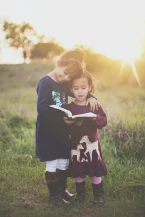Kid''s Emotional Wellbeing

The impact of childhood experiences on adult mental health
Our childhood experiences play a significant role in shaping who we become as adults, particularly in terms of our emotional wellbeing. The way we were raised, the emotional climate of our homes, and how our parents responded to our feelings and emotions can all have a profound impact on our mental health in adulthood.
As highlighted in the video script, the current mental health landscape shows a steady increase in psychological distress among adults. One in eight Australians suffer from some form of anxiety disorder and one in ten Australians suffer from depression. This increase is deeply rooted in the imprints we received as children around how to express feelings and emotions.
The lack of emotional literacy in our culture further exacerbates this issue. We don’t teach parents how to respond to children’s feelings and emotions with empathy and compassion. We don’t teach it in our kindergartens. We don’t teach it in our schools. Somehow we still value IQ far more than we value EQ. This lack of emotional literacy means that many adults struggle to manage their emotions effectively and deal with the challenges that life throws their way.
Research has shown that childhood experiences of neglect, abuse, and trauma can have long-lasting effects on mental health. Adults who experienced these adverse childhood experiences (ACEs) are more likely to suffer from mental health issues such as anxiety, depression, and PTSD. They are also more likely to engage in risky behaviors such as substance abuse and self-harm.
However, it’s not just severe cases of childhood trauma that can have an impact on mental health. Even seemingly small experiences, such as being told to “stop crying” or being sent to your room for expressing emotions, can have a lasting impact on emotional regulation and coping mechanisms.
The good news is that there is hope for healing and recovery. With the right support and resources, adults can work through the effects of childhood experiences and develop healthier coping mechanisms. This can involve therapy, support groups, self-help strategies, and mindfulness practices.
In conclusion, our childhood experiences have a significant impact on our mental health as adults. It’s essential that we prioritize emotional literacy in our culture and teach parents and children alike how to respond to emotions with empathy and compassion. By doing so, we can work towards creating a healthier and more resilient society.
; Expression as a coping mechanism)
Three ways that children learn to deal with emotions
Children learn to deal with emotions in different ways, depending on their experiences and the responses they receive from the adults in their lives. In this blog post, we will discuss three ways that children learn to deal with emotions - repression, aggression, and expression - and how they can impact mental health in adulthood.
Repression as a coping mechanism
Repression is a coping mechanism that children often learn when they are taught that expressing their emotions is not safe or acceptable. This can happen when parents dismiss their child’s emotions, tell them to “stop crying,” or make them feel ashamed for expressing their feelings.
Children who learn to repress their emotions may develop a pattern of pushing their feelings deep down inside. As adults, these repressed emotions can resurface, often triggered by experiences that remind them of the original trauma. This can result in anxiety, depression, and other mental health issues.
Aggression as a coping mechanism
Aggression is another coping mechanism that children may learn when they feel powerless and unable to express their emotions. This can happen in authoritarian households, where children are not allowed to voice their feelings or opinions.
Children who learn to cope through aggression may develop a pattern of lashing out in response to stressful situations or when feeling threatened. As adults, these tendencies can manifest in bullying behavior, harsh self-criticism, and even violence.
Expression as a coping mechanism
Expression is a healthy way for children to cope with emotions, but it is often discouraged in our culture. Children who learn to express their emotions are encouraged to explore and feel their feelings fully. They are taught that it’s okay to be vulnerable, and that their emotions are valid and important.
Children who learn to cope through expression may develop a pattern of leaning into their emotions when faced with stressors. As adults, these individuals are more likely to engage in healthy coping mechanisms, such as journaling, talking to friends, and seeking therapy.
In conclusion, it’s essential for parents and caregivers to encourage healthy emotional expression in children. By fostering a safe and supportive environment for children to explore their emotions, we can help them develop healthier coping mechanisms that will benefit them throughout their lives. As adults, we can also work to identify any unhealthy patterns we may have developed in response to childhood experiences and work towards healing and recovery.
Expression as a coping mechanism
In this blog post, we will explore the importance of expression as a healthy coping mechanism for children and its impact on their emotional wellbeing.
The importance of empathy and compassion in responding to children’s emotions
Empathy and compassion are key components in responding to children’s emotions. When children feel heard and validated, they are more likely to develop healthy coping mechanisms for managing their emotions. Empathy involves understanding and sharing the feelings of others, while compassion involves taking action to ease their suffering.
When adults respond to children’s emotions with empathy and compassion, they create a safe and supportive environment for the child to express themselves. This, in turn, encourages healthy emotional expression and helps children develop emotional intelligence.
The role of parents in fostering emotional wellbeing in children
Parents play a crucial role in fostering emotional wellbeing in children. By creating a safe and supportive environment, parents can encourage healthy emotional expression and help their children develop healthy coping mechanisms for managing their emotions.
One way parents can foster emotional wellbeing is by practicing active listening. Active listening involves paying attention to what the child is saying, reflecting on their emotions, and responding with empathy and compassion. By doing so, parents can help their children feel heard and understood, which can lead to healthier emotional development.
Parents can also model healthy emotional expression for their children. By expressing their own emotions in a healthy and constructive way, parents can teach their children the value of emotional intelligence and healthy coping mechanisms.
In conclusion, expression is a critical coping mechanism for children’s emotional wellbeing. Parents can play a vital role in fostering emotional development in their children by responding with empathy and compassion and modeling healthy emotional expression. By doing so, parents can help their children develop the emotional intelligence and healthy coping mechanisms that will benefit them throughout their lives.
The creation of Woodline Primary School and its philosophy
In this blog post, we will explore the creation of Woodline Primary School and its philosophy of fostering emotional wellbeing in a safe learning environment.
The creation of Woodline Primary School
Woodline Primary School is a primary school located in the Geelong hinterland on a beautiful farm with abundant nature. The school was created around 18 months ago by a colleague and the speaker of the video script. The school’s philosophy is centered around fostering emotional wellbeing in a safe learning environment.
The founders of Woodline Primary School recognized that when children feel safe to learn, free of judgment and criticism, treated with kindness and respect, where they have autonomy over their bodies and their learning, and are given much love and celebration about the unique differences in who they are, then their neurological systems become fully operational and their capacity for growth and learning increases.
Critical life skills taught at Woodline Primary School
Woodline Primary School teaches critical life skills such as emotional intelligence, growth mindset, critical thinking, and a love of failure because every time you fail, you realize there are so many more options you haven’t yet explored. In addition, the school fosters compassion, connection, and mindfulness in every aspect of their curriculum.
By prioritizing emotional wellbeing and connection, Woodline Primary School aims to create a supportive and enabling learning environment for its students. By developing critical life skills such as emotional intelligence and growth mindset, the school aims to prepare its students for success not just in academics, but in life as well.
Prioritizing connection, heart, and compassionate listening in every relationship
At Woodline Primary School, prioritizing connection, heart, and compassionate listening is at the center of every relationship. The school recognizes that healthy relationships are built on mutual respect, empathy, and compassion.
By prioritizing these values in every relationship, the school fosters a sense of community and belonging that is critical for emotional wellbeing. This approach not only benefits students but also extends to the entire school community, including teachers, staff, and parents.
In conclusion, Woodline Primary School’s philosophy of fostering emotional wellbeing in a safe learning environment is a critical aspect of preparing students for success in academics and life. By prioritizing connection, heart, and compassionate listening in every relationship, the school aims to create a supportive and enabling learning environment that fosters critical life skills such as emotional intelligence and growth mindset.
Conclusion
It is evident that childhood experiences greatly impact adult mental health. The lack of emotional literacy in our culture can contribute to the steady increase in psychological distress among adults. As children, we learn to deal with emotions in various ways, such as repression and aggression. However, the most effective coping mechanism is expression, where empathy and compassion play a significant role in responding to children’s emotions.
Parents have a crucial role in fostering emotional wellbeing in children. Instead of harsh disciplines and punishments, they can employ compassionate listening, loving limits, and boundaries. By looking behind a child’s behavior, parents can understand the reasons behind it and respond accordingly.
The creation of Woodline Primary School and its philosophy prioritize emotional wellbeing in a safe learning environment. Students at Woodline Primary School not only learn about the world but also develop critical life skills such as emotional intelligence, growth mindset, and critical thinking. Connection, heart, and compassionate listening are at the center of every relationship, creating a compassionate citizen of the earth.
Overall, prioritizing emotional literacy in our culture, promoting expression as a coping mechanism, and fostering emotional wellbeing in children can lead to a healthier and happier society.
















